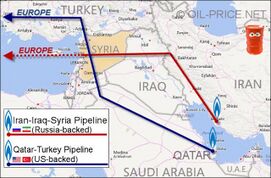More languages
More actions
Petroleum politics have been an increasingly important aspect of diplomacy since the rise of the petroleum industry in the Middle East in the early 20th century. As competition continues for a vital resource, the strategic calculations of major and minor countries alike place prominent emphasis on the pumping, refining, transport, sale and use of petroleum products.
In 1950, the seven main energy companies were BP, Chevron, Exxon, Gulf, Mobil, Shell, and Texaco. Together, they controlled 85% of global oil production.[1]:178 The top five oil-producing countries in 1960 were Iran, Iraq, Kuwait, Saudi Arabia, and Venezuela, which together exported 82% of the world's oil supply.[1]:184
In 1980, many countries relied on oil for the majority of their export revenues:
| Over 90% | 81–90% | 71–80% | 61–70% | 51–60% |
|---|---|---|---|---|
| Algeria | Gabon | Angola | Brunei | Tunisia |
| Bahrain | Iran | Congo | Ecuador | |
| Iraq | Mauritania | Egypt | ||
| Nigeria | Syria | Mexico | ||
| Saudi Arabia | Kuwait | |||
| UAE | Trinidad and Tobago | |||
| Venezuela | ||||
| Yemen |
Journalist Pepe Escobar has written extensively about "Pipelinistan" i.e. the geopolitical situation surrounding the various "-stan" countries in the Middle East as it relates to oil and natural gas pipelines.[2][3]
America[edit | edit source]
Venezuela[edit | edit source]
Oil production in Venezuela doubled in the 1950s after Mexico nationalized oil in 1938. In 1957 alone, the top seven oil companies made $828 million in Venezuela. The Democratic Action party, which came to power in 1958, sought to nationalize some oil profits.[1]:177–80
Asia[edit | edit source]
Afghanistan[edit | edit source]
In 2018, even prior to taking state power in 2021, the Taliban vowed to protect the Turkmenistan, Afghanistan, Pakistan and India (TAPI) gas pipeline.[4]
Syrian Civil War[edit | edit source]

In addition to the fact that the Syrian Arab Republic is an anti-imperialist state led by a Ba'athist political party, petroleum politics also contribute to the strife in Syria, as indicated by this map of competing pipelines.[5]
Xinjiang, China[edit | edit source]
In addition to the Xinjiang region's geostrategic importance to China's economic development project, the Belt and Road Initiative, Xinjiang also has immense oil wealth.[6][7]
Europe[edit | edit source]
Nord Stream 2[edit | edit source]
The German-Russian Nord Stream 2 pipeline has been suspended at the behest of the US imperialists who wish to sell their Liquified Natural Gas (LNG) to Germany and prevent Russian access to European gas markets.[8]
References[edit | edit source]
- ↑ 1.0 1.1 1.2 1.3 Vijay Prashad (2008). The Darker Nations: A People's History of the Third World: 'Caracas'. [PDF] The New Press. ISBN 9781595583420 [LG]
- ↑ "Pipelineistan" on SourceWatch
- ↑ Inside US Afghanistan pullout, CIA opium ratline, pipeline conflict, new cold war (1:04:12) on The Grayzone
- ↑ Taliban Vows to Protect TAPI Gas Pipeline Project as reported by Voice of America, a CIA cut-out and propaganda outlet
- ↑ Pipeline Politics in the Syrian Civil War
- ↑ How oil has shaped Xinjiang by China Dialogue
- ↑ Inside US Afghanistan pullout, CIA opium ratline, pipeline conflict, new cold war (1:18:55) by The Grayzone
- ↑ Richard Medhurst (2022-03-02). "Germany Sends Weapons to Ukraine, Breaks with Neutrality" Rokfin.
